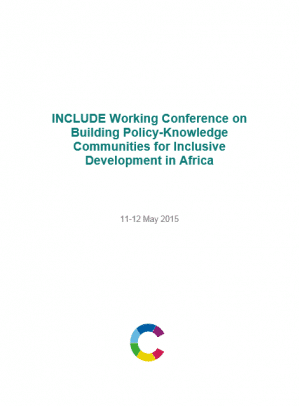
To build policy-knowledge communities in Africa, the Knowledge Platform on Inclusive Development Policies (INCLUDE) organised a two-day working conference in Nairobi, Kenya. The conference, held on 11-12 May 2015, brought together about 70 policy stakeholders, including Platform members, researchers, policymakers, and practitioners from international development organisations and NGOs from Africa and beyond. Two policy-knowledge communities on ‘productive employment in horticultural value chains’ and ‘female entrepreneurship’ were established. The conference was co-hosted by the Africa Economic Research Consortium (AERC) in Kenya.
Highlights
INCLUDE seeks to continue to promote evidence based inclusive development policies through the establishment of two policy-knowledge communities focusing on productive employment in horticultural value chains and on female entrepreneurship. The policy-knowledge communities will leverage on existing networks and collaborations to support policy relevant research, package it appropriately and get it to the policy makers.
The African Development Bank believes that high value agricultural value chains in Africa offer opportunities for women to participate in horticulture value chains. The Bank plays a brokerage role in knowledge management and may form partnerships with individual researchers or thinks tanks with the knowledge and advice to strengthen the Bank’s policy dialogue and to ensure that the knowledge generated is disseminated widely. INCLUDE therefore is a natural partner.
Major policy questions on productive employment in horticultural value chains are how best to organise smallholder farmers integration into value chains? What modalities are most suitable for this? What are the best practices? INCLUDE may provide answers through useful knowledge products such as working practices, models or case studies; market assessments such as market survey, value chain analysis and studies; and farming practices such as good agricultural practices and smart agriculture. Responding to the knowledge needs, INCLUDE studies are investigating new contracting models that smallholder farmers can use to access markets; setting up service centres to enhance farmers’ access to services in rural areas; and how policies influence development in horticulture among other focus areas. Research findings should be available to the public and easy accessible.
There are various policy questions on female entrepreneurship that seek an answer on how to improve the status and productivity of women businesses, such as the effectiveness of investment regulations reform; women’s capacity needs; education and performance in the informal sector; the use of technology and improving access to information; the role of women groups; bridging rural-urban divide; and the use of media for positive reporting. INCLUDE may provide useful answers through policy analysis and providing data data/information on women enterprise development and community involvement. Research from African government agencies is often scattered and needs to be packaged as usable data for policy formulation. This can be done through easy understandable policy briefs, newsletters, documentaries, and publications on lessons learnt and good practices. Responding to the need of knowledge, on-going INCLUDE studies are investigating the conditions under which small rural and female entrepreneurs grow and resource centres to inform policy have been set up; and how gender norms impact on practices and what constraints women experience.
There is appropriate knowledge, but research is incomplete without linking with policymakers. Working together with the private sector, the not-for-profit sector and other stakeholders through a policy-knowledge community is therefore promising.
Involving policy stakeholders at all stages of research especially from the start is preferable because the policy stakeholders become part of the research and are more likely to use evidence generated to inform policy. Researchers can also work with policy champions or those who work with policy makers on a day-to-day basis to help them lobby for utilisation of research evidence.










